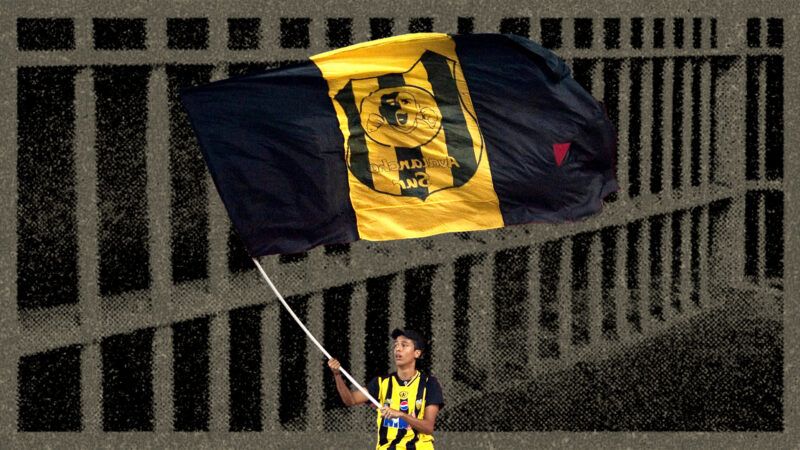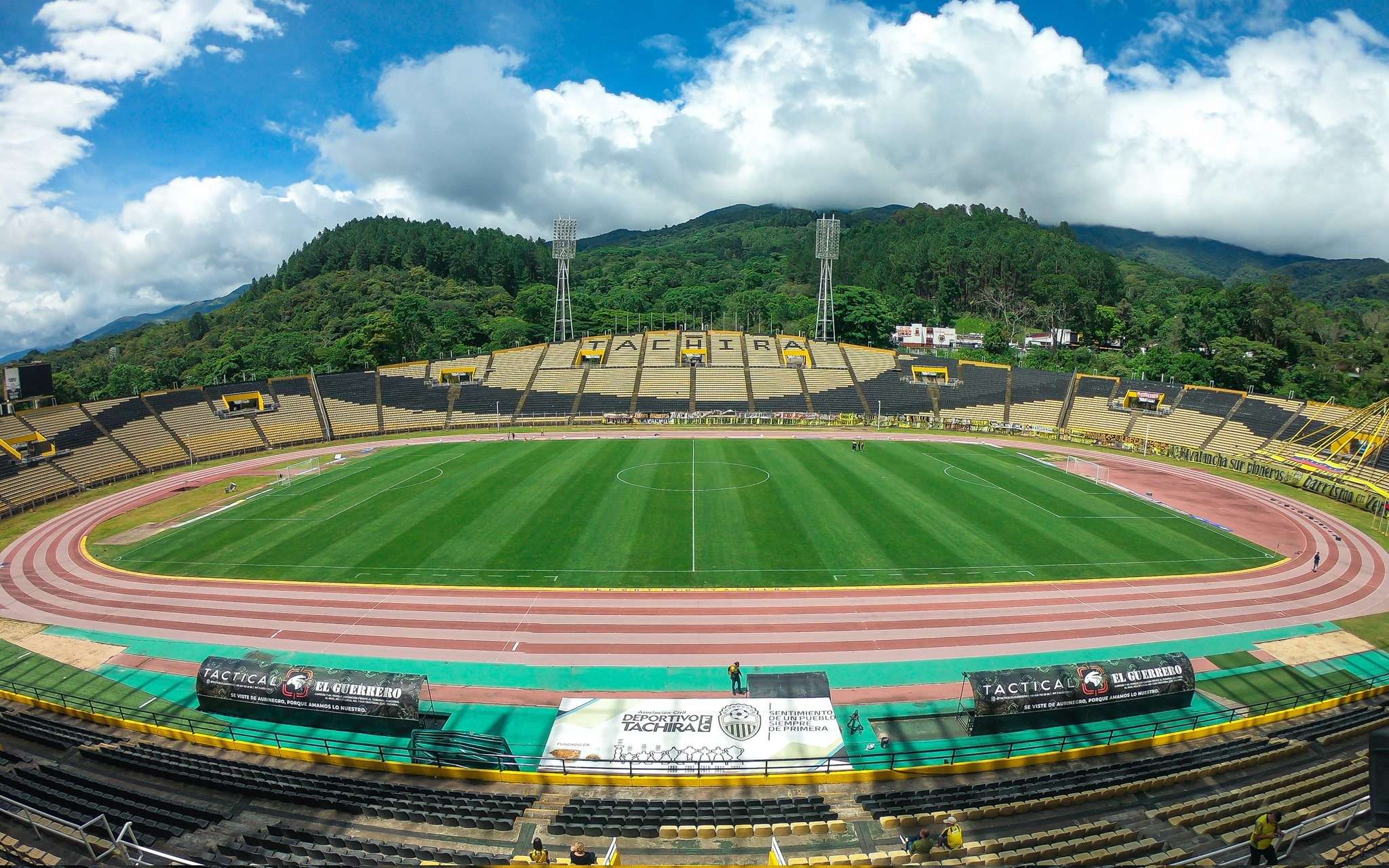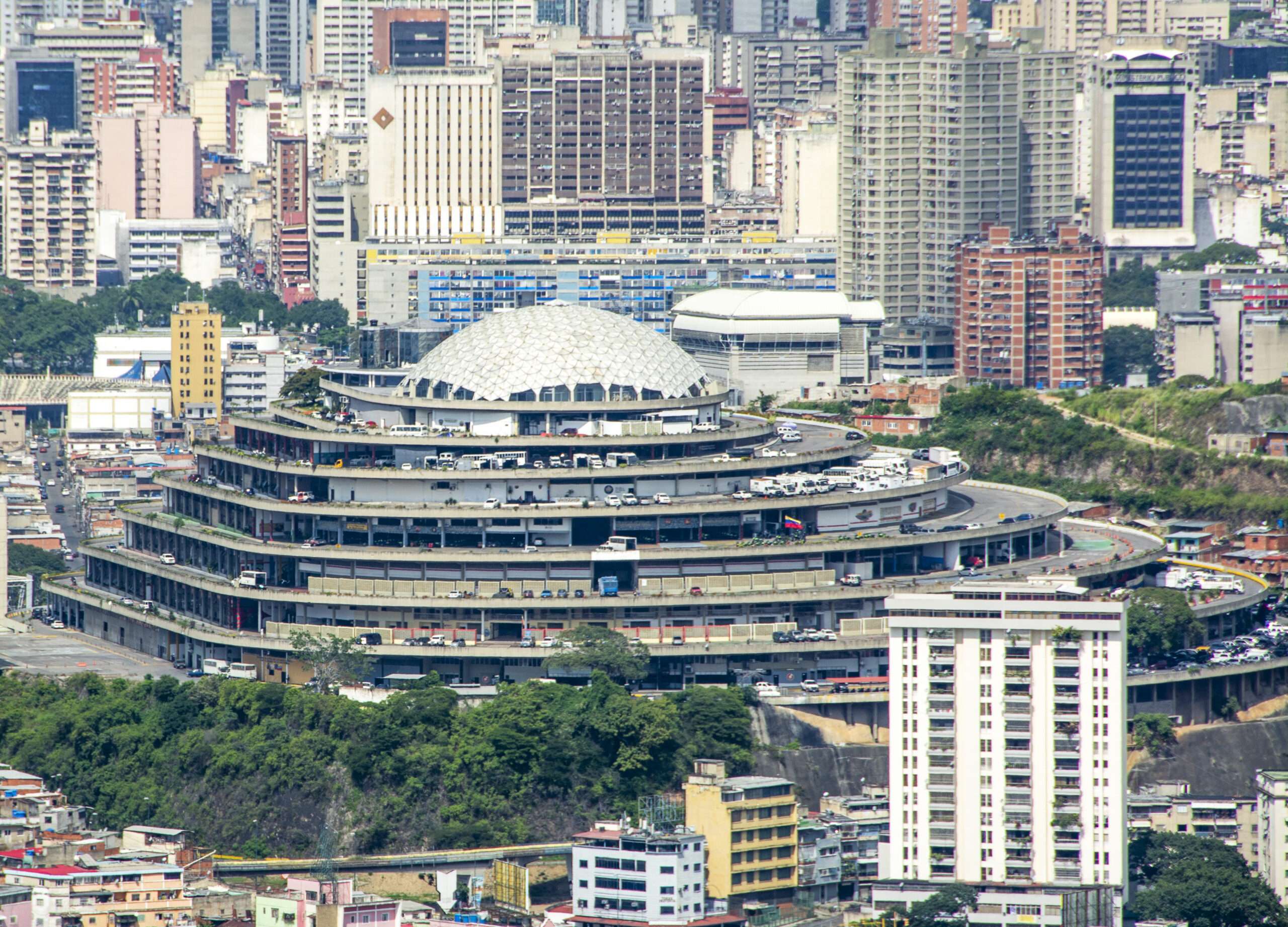He Took a Bus To Watch His Soccer Team. Instead, He Ended Up in a Venezuelan Prison.
Fans of Deportivo Táchira wanted to see their team play in the league final. The mafia state made sure most never made it.

On a chilly Friday night in mid-June, Samuel boarded a chartered bus for a 14-hour journey along Venezuela's winding, decrepit highways. The bus had no air conditioning, no reclining seats, no space for bags or coolers, and no curtains to block the morning sun. At night, armed gangs and corrupt cops (there isn't much difference) patrolled the roads.
But the risk and discomfort seemed worth it for Samuel, his wife Julia, and their 8-year-old daughter, who shared his seat. The bus was part of a 20-vehicle caravan, packed with rowdy soccer fans dressed head to toe in team colors. They were headed to Caracas to cheer on Deportivo Táchira in the national soccer league final against Universidad Central de Venezuela.
Samuel, 33, is a bank clerk earning about $150 a month—barely enough to survive. He lives in Lobatera, a town in the state of Táchira, nestled in the Venezuelan Andes. About a quarter of Venezuela's population has left the country over the last decade, but in Táchira, it's even worse: more than 40 percent of the local population has fled. San Cristóbal, the capital and largest city, now feels like a ghost town.
Samuel lives for soccer. He remembers holding his father's hand as they walked into Deportivo Táchira's stadium for the first time, when he was 13. The towering concrete structure in the Andean foothills is known as "the sacred temple of Venezuelan soccer." Its setting makes it feel like a real house of worship. The smell of pine wafts through the bleachers. And when fans start chanting, the sound reverberates through the mountains.

When Samuel was growing up, Deportivo Táchira embodied the region's distinct cultural identity. Residents of Táchira are often referred to as gochos, which means "dirty and unkempt." But the locals embraced the label. Today, the name has mostly positive connotations.
Gochos are known for their honor and bravery, especially during the 2014 anti-government protests. When Nicolás Maduro's dictatorship sent armed soldiers into the streets and began hauling student leaders off to distant jails, the gochos refused to give up. Hundreds were maimed or murdered.
Most survivors of the protests have fled Venezuela. Those who stayed, like Samuel, cheer for their team, make overnight pilgrimages to distant stadiums, and stay out of politics.
But on this trip, that would prove impossible. The caravan would never make it to the game. Samuel would be arrested. Soccer, once a last refuge of sanity in a broken country, was being weaponized by the mafia state. (Some names in this article have been changed to protect the safety of those involved and to prevent possible retaliation.)
From Community Beacon to Political Trophy
In Venezuela, regional soccer franchises are typically owned by the superwealthy elite, much like in the U.S. The difference is that in Venezuela, most of the ultra-rich got that way because they're enchufados (meaning "plugged in")—deeply connected to Maduro's inner circle.
Deportivo Táchira's owner, Jorge Silva, is one of them. He rose from a low-level government worker to multimillionaire through government contracts, including a deal personally brokered by Diosdado Cabello, Maduro's second-in-command (wanted by U.S. authorities and accused of crimes against humanity).
In just under two years, Silva's company, Grupo JHS, went from having no assets to holding tens of millions of dollars in foreign bank accounts. By 2024, Silva was involved in a joint venture with Venezuela's state-owned oil company, despite having no prior experience in the energy sector.
After acquiring the team in 2016, Silva began treating Deportivo Táchira as an extension of his personal brand. Many were surprised when the barra brava—the team's most rabid fans—seemed to align with Silva's agenda. During halftime at the club's 50th-anniversary match in 2024, the barra brava unveiled a massive banner on Silva's behalf, asking Miss Universe supermodel Sthefany Gutiérrez to marry him. (She said yes.)
Minutos antes del partido amistoso entre el Deportivo Táchira con Atlético Bucaramanga, Jorge Silva-presidente del Deportivo Táchira- le pidió matrimonio a su novia, la ex Miss Venezuela, Sthefany Gutiérrez con la complicidad de la barra Avalancha Sur.
Video: @jorgesilvacard1 pic.twitter.com/vDrWzCi1Re— La Prensa del Táchira (@LaPrensaTachira) January 14, 2024
The proposal felt like a turning point: Deportivo Táchira no longer belonged to the fans. It belonged to Silva.
Though Silva has tarnished the team's image, he could be worse. The team Deportivo Táchira was set to face in Caracas, Universidad Central de Venezuela FC (UCV), is owned by Col. Alexander Granko Arteaga, one of the country's most feared public figures. A senior officer in Venezuela's military intelligence unit, Granko is sanctioned by the United States, the European Union, and Canada. His name is tied to torture centers and forced disappearances.
El interés de Granko Arteaga por adueñarse del UCV-FC se hizo evidente en 2024. A la gerencia castrense del club y la insignia del Team Espartanos en su indumentaria, se sumó la llegada de su hijo, de 16 años de edad, procedente del club Metropolitanos FC https://t.co/eelwgIcyDb pic.twitter.com/4LOI77SCbz
— Armando.Info (@ArmandoInfo) July 26, 2025
Granko's team shares its name with Venezuela's oldest public university but has no affiliation with the school and never received permission to use the name. The university has objected, but Granko is a powerful man—powerful enough to ignore them and even install his talentless 16-year-old son as a regular starter.
For Samuel, none of that mattered. Not politics, not corruption, not even nepotism on the field could dull the thrill of watching his team play in Caracas.
Power Brokers Weaponize Soccer
The buses wound east through the night, headlights slicing through the mountain mist. Inside, the air was thick with the scent of sweat, gasoline, and arepas—stuffed cornmeal sandwiches. A battered speaker near the front blasted cumbia villera, the Argentine music that backs soccer chants across much of Latin America.
Samuel and his family tried to get some rest, but between the potholes, the chanting, and the music, it was impossible. Besides, on Venezuela's highways after dark, it's better to stay awake.
Samuel had traveled this road many times before. He knew to expect alcabalas—checkpoints set up by the National Guard, the police, or sometimes both. Some were marked with cones and lights; others were just a uniformed man with a rifle slung over his shoulder, waving down traffic with a flashlight.
By sunrise, the bus had already been stopped seven times. At each checkpoint, officers collected IDs and said they would "radio them in"—the official term for checking outstanding warrants. They didn't actually radio anyone; that wasn't the point. The goal is extortion. Officers typically search bags for valuables, demand "fines," or seize IDs to hold for ransom. With salaries too low to live on, this is how cops survive.
Samuel drifted into a daze, head propped against the window, knees pressed to the seat in front. Outside, fog and concrete blurred past, broken only by the occasional gas station, palm tree, or stray dog. The music had died down—or maybe he'd just tuned it out. His daughter slept across Julia's lap.
Near the city of Maracay, about 80 miles from Caracas, they were stopped again. A police convoy blocked the road. But something felt different this time. The officers were colder. There were no quick "speed-up" deals. No bribes were accepted.
The officers weren't shaking them down, Samuel realized. They were stalling them.
Meanwhile, in Caracas, pregame buzz was building. Kickoff was just hours away. Fans streamed into the stadium, radio hosts dissected the lineup, and vendors sold steaming tequeños—crispy cheese-filled pastries.
As time dragged on, passengers grew restless. There was little food left, and no air circulating on the bus. Some slipped into the brush to relieve themselves. Others got out to demand answers. When a cop shoved a fan, someone pushed back. During the scuffle, a patrol car was damaged.
Vergonzoso lo que ocurrió previo a la final UCV y Tachira.
La policía de la dictadura detuvo sin motivos a decenas de hinchas que aún no vuelven a sus hogares, y otros cientos vivieron un calvario en la ruta yendo al estadio.Una vez más el fútbol y la dictadura en @FVF_Oficial pic.twitter.com/OvIA9VYrcf
— Sin Falta (@SinFaltapy) June 17, 2025
The police convoy refused to clear the road. By 5:30 p.m., kick-off had begun.
Trapped on the bus, Samuel pulled out his phone and watched the game from his seat. After halftime, Granko's son took the field. Cameras panned to a sea of blue jerseys with a Spartan logo—an emblem from one of Granko's private companies that sponsors the team. It matched the one worn by the military officers he commands. There was something sad and soulless about the scene: military haircuts, interchangeable faces, and state-issued shirts. These weren't real fans.
UCV, after all, doesn't have a loyal fan base. Most games play out in half-empty stadiums, filled out by police cadets and state employees, probably coerced by their superiors to attend the games. Maybe Granko didn't want busloads of Deportivo Táchira fans taking over the bleachers—and stalled Samuel's caravan to make sure of it.
UCV won 1–0. But there was no roar of drums, no chorus of chants.
After the game, UCV player Alexander "Makelele" González hoisted the golden trophy, wearing a black tactical helmet typically reserved for special forces.
The game was over, and the caravan dissolved. Some buses headed toward the beach to salvage the trip. Others turned home in silence. Samuel's bus rolled into Maracay shortly after 10 p.m.
Silence and the Spectacle
The bus pulled into a small roadside rest stop. As the engine idled, two police patrols, 10 motorcycles, and a truck rolled in. "Everyone get back on the bus," they ordered.
They called it a routine check. When the fans hesitated, one of the officers snapped: "Either you board willingly, or we'll make you." When the cops boarded, they began collecting phones and IDs.
Samuel's chest tightened when the officers announced they were escorting the bus to a checkpoint near Caracas. But at 3 a.m., they pulled into the police headquarters inside the city. The passengers were told to stay on the bus and remain silent.
One passenger who had managed to hide a phone sent a message home to alert their family.
After nearly 18 hours parked outside the police headquarters, daylight had passed, and dusk was settling in. The cops let Julia and their 8-year-old daughter go. Samuel watched from the window as they stumbled off, heading to a friend's nearby, hoping they'd all return home together soon.
Twenty-nine passengers remained on the bus. They were told they were being arrested and transferred to a prison called El Helicoide for processing, charged with obstructing public order, assaulting officers, and damaging state property.
El Helicoide is a curved, fortress-like complex built as a futuristic shopping mall that serves as the headquarters of Venezuela's secret police and is widely known as a torture center.

Fortunately, Samuel and the other travelers wouldn't have to stay overnight. Upon arrival, they were separated, photographed, interrogated, examined, and then returned to the police station. Conditions weren't terrible. Deportivo Táchira even sent rotisserie chickens and hamburgers.
Fans, including some living abroad, raised money for their legal defense. Sources told Reason prosecutors had demanded up to $1,500 per person to drop the charges.
Four days after they'd set out on their journey to Caracas, the lawyers struck a deal: 24 of the detainees, including Samuel, would be provisionally released. Five men would remain in custody: the bus driver and four others accused of attacking an officer.
There's no evidence to back up their accusation. Authorities pointed to the damaged patrol car and a viral photo of a police officer with a head wound. But sources told Reason that none of the detainees were involved in the scuffle; they were simply targeted because their bus was the last in the caravan, making it the easiest to isolate.
Samuel and the others were freed but must return to Caracas to appear before a judge—even though they live on the other side of the country.
Early the next morning, a Deportivo Táchira team bus arrived to take them home. Samuel took a seat next to Julia and their daughter. When they pulled into the stadium parking lot in San Cristóbal, a crowd of fans was waiting, waving team flags and chanting. As the men stepped off the bus, their family members were in tears.
Llegada de los 24 Hinchas que el Gobierno dejó libres, pero faltan 5 #LiberenALosAurinegros
Somos hinchas no terroristas. pic.twitter.com/gR8knCMDwV
— Forza Aurinegra (@ForzaAurinegra) June 19, 2025
The 24 men now live in fear of being arrested again. The families of the five men still in prison declined to be interviewed.
Deportivo Táchira quietly withdrew its support for the arrested fans after Diosdado Cabello defended the arrest on his weekly state TV show, claiming the group had endangered the police and nearly killed one.
Today, Samuel is back at work. Fans in Chile, Bolivia, Paraguay, and Ecuador have held up banners in stadium bleachers reading Libertad para los cinco de Táchira—"Freedom for the Táchira five." They're the Venezuelan diaspora, rooting for new teams in their adopted countries, but they haven't forgotten the sacred temple and the smell of fresh pine in the Andean air.
Most weekdays at noon, Samuel props a portable radio beside his teller's window to tune in the game. The revolution hasn't taken everything.
